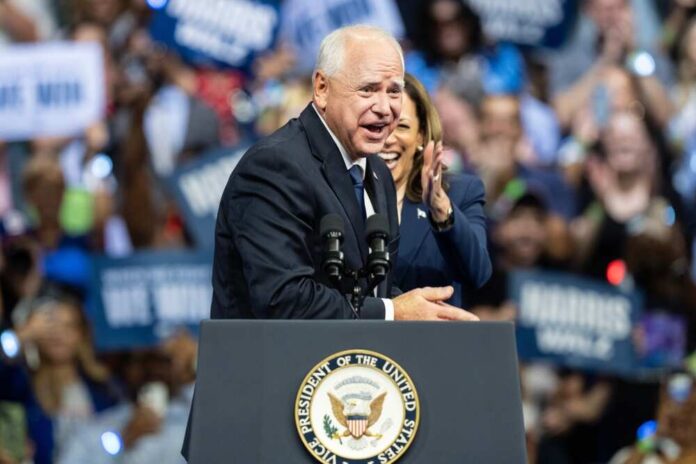
Mounting criticism is directed at the Biden-Harris administration and the Pentagon for not disclosing information about Minnesota Governor Tim Walz’s numerous trips to China.
The Biden-Harris administration and the Pentagon are facing increasing scrutiny for not sharing details about Minnesota Governor Tim Walz’s multiple trips to China. Lawmakers and reporters have raised concerns over the potential hidden agendas and national security risks associated with these journeys. The administration’s lack of transparency is sparking debates about governmental accountability.
“The Biden-Harris Pentagon is refusing to answer questions from Congress and the media on Democrat vice-presidential nominee Gov. Tim Walz’s (D-MN) frequent travel to China — which poses risks for members of the military and raises questions of whether or not Walz reported these trips to the Army National Guard while he was serving.”
Concerns are heightened by the fact that U.S. military members generally need to report or seek permission for overseas travel, especially to countries like China that pose challenges to U.S. interests. Despite these protocols, the Biden-Harris Pentagon remains silent on whether similar protocols were followed in Walz’s case.
Governor Walz has reportedly visited China around 30 times, with many of these trips occurring during his service in the Army National Guard. It remains unclear if he reported these travels to his command or whether he held the necessary security clearances. These links raise legitimate questions about the monitoring and vetting processes for high-profile individuals with frequent interactions overseas.
What do we have here? https://t.co/RXKeb1qLYl
— Breitbart News (@BreitbartNews) September 2, 2024
House Armed Services Military Personnel Subcommittee Chairman Jim Banks has requested information from Defense Secretary Lloyd Austin and the acting chief of the National Guard on this matter. However, the Pentagon has yet to respond to Banks’ inquiries, which raises more questions about the administration’s reluctance to provide transparency.
On top of these unanswered questions, Walz’s spokesperson and the Minnesota National Guard have not responded to inquiries regarding his trips to China. The silence from various quarters lends itself to speculations and further raises suspicions.
According to retired senior NCOs, most Army National Guard staff sergeants would typically require a security clearance and need to report such trips. This adds complexity to the situation, as it remains unknown if Walz did so. Security clearance expert Sean Bigley stated that receiving funding from China would likely bar someone from obtaining a security clearance.
Former NSA officer John Schindler also emphasized that approvals from Chinese authorities would have been required for Walz’s trips, making the frequency and nature of these travels even more suspect. Inevitably, such factors are critical when scrutinizing the possible national security risks posed by these trips.
Walz’s frequent trips to China, combined with the significant funding he reportedly received from the Chinese government, have only heightened security concerns. These raised red flags among security experts, who agree that such extensive and regular travel to China would have necessitated rigorous oversight. As the criticism mounts, the Biden-Harris administration faces enhanced scrutiny to be more transparent about these overseas missions.
The lack of transparency in disclosing the details of these trips reflects poorly on the administration’s stance on governmental transparency and accountability. Lawmakers, security experts, and the media will likely continue pressing for answers as the discourse around Walz’s travels and the broader implications for national security amplify.
Kamala and Biden are politicizing the Pentagon by using their power to stonewall inquiries into Tim Walz security clearance as it relates to his trips to Communist China:
https://t.co/PqUdhTaxYN— Matthew Boyle (@mboyle1) September 1, 2024














